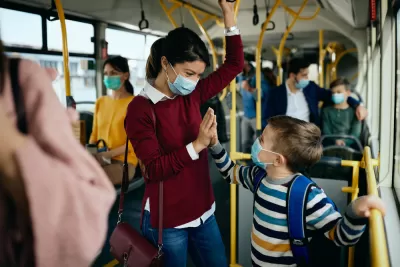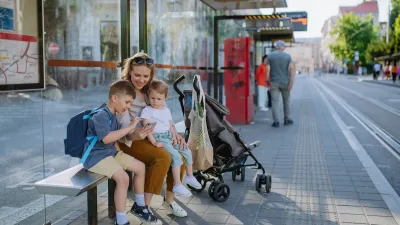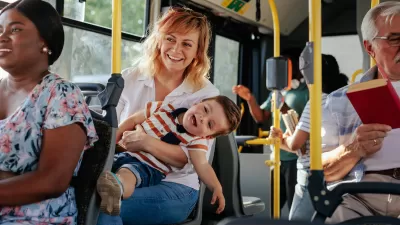Public transit can often be inconvenient or unsafe for people with children in strollers and riders traveling for purposes other than commuting. Agencies are working on ways to fix that.

Transit agencies face a variety of challenges, particularly post-pandemic. For some riders, the lack of family-friendly features and amenities makes transit more difficult or impossible. As H. Jiahong Pan explains in Next City, “These agencies are slow to make changes to ensure women and families feel welcome on public transit, whether through policy, service or seating layout adjustments.”
While most transit planners view public transit through the lens of commuting, Investing in Place’s Jessica Meaney explains that “Other countries have really widened that perspective to look at how we get kids to school, how we get people to health care, how we get to the grocery store, how we get to the park, how we live our lives.” According to a 2019 report from the Los Angeles Metropolitan Transportation Authority, “women, who travel predominately for household chores, school or daycare, and often while caring for other people, bore the brunt of transportation costs and harassment yet received the least help.”
L.A. Metro has pledged to support families through its Gender Action Plan. “The plan calls for collecting data disaggregated by gender to understand how policy changes would affect people of different genders; building out restrooms with specific amenities; prioritizing household-serving entities such as grocery stores and childcare at transit stations, providing real-time arrival and bus crowding information; and following in Tri Delta Transit’s footsteps in redesigning buses’ seating layout to support riders who bring aboard unfolded strollers.”
Other agencies around the country are taking actions to make transit easier and safer for women, children, and other vulnerable users, changing stroller policies and making bus service more frequent during non-rush hours.
FULL STORY: Transit Agencies Are Taking Small Steps Toward Family-Friendly Systems

Alabama: Trump Terminates Settlements for Black Communities Harmed By Raw Sewage
Trump deemed the landmark civil rights agreement “illegal DEI and environmental justice policy.”

Planetizen Federal Action Tracker
A weekly monitor of how Trump’s orders and actions are impacting planners and planning in America.

The 120 Year Old Tiny Home Villages That Sheltered San Francisco’s Earthquake Refugees
More than a century ago, San Francisco mobilized to house thousands of residents displaced by the 1906 earthquake. Could their strategy offer a model for the present?

Ken Jennings Launches Transit Web Series
The Jeopardy champ wants you to ride public transit.

BLM To Rescind Public Lands Rule
The change will downgrade conservation, once again putting federal land at risk for mining and other extractive uses.

Indy Neighborhood Group Builds Temporary Multi-Use Path
Community members, aided in part by funding from the city, repurposed a vehicle lane to create a protected bike and pedestrian path for the summer season.
Urban Design for Planners 1: Software Tools
This six-course series explores essential urban design concepts using open source software and equips planners with the tools they need to participate fully in the urban design process.
Planning for Universal Design
Learn the tools for implementing Universal Design in planning regulations.
Clanton & Associates, Inc.
Jessamine County Fiscal Court
Institute for Housing and Urban Development Studies (IHS)
City of Grandview
Harvard GSD Executive Education
Toledo-Lucas County Plan Commissions
Salt Lake City
NYU Wagner Graduate School of Public Service





























